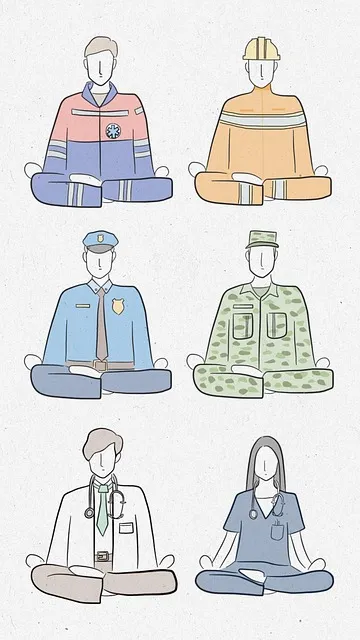Parker's transformative journey with anxiety and depression highlights Kaiser's innovative inpatient mental health services, which focus on resilience building through holistic care. Their Resilient Mind Model (RFM) framework emphasizes reach, frequency, and motivation to enhance long-term well-being. Inpatient programs integrate therapy, medical care, mindfulness, and communication strategies to empower individuals like Parker with coping skills, leading to improved mental health outcomes post-discharge.
“Uncovering the power of resilience is a vital step towards enhancing long-term mental wellbeing, especially for those navigating challenging mental health journeys. This article explores the concept of RFM (Recovery, Functioning, and Mastery) as a framework for building resilience. We delve into the transformative experiences of Parker, who overcame struggles through targeted interventions, and Kaiser’s inpatient program, renowned for its success in promoting recovery. Discover effective resilience-building exercises and understand how RFM can empower individuals to thrive.”
- Understanding RFM and Resilience: An Overview
- Parker's Journey: A Case Study in Mental Health
- Kaiser's Inpatient Program: Facilitating Recovery
- Effective Resilience Building Exercises
- The Impact of RFM on Long-Term Mental Wellbeing
Understanding RFM and Resilience: An Overview

Resilience, the ability to bounce back from adversity and adapt to change, is a crucial aspect of emotional well-being promotion techniques. It equips individuals with the mental fortitude to navigate challenging situations, making it an essential component in mental health awareness initiatives. Parker and Kaiser’s work in this field has been pioneering, offering innovative strategies for building resilience, especially through their inpatient mental health programs.
Their Community Outreach Program Implementation is a notable example of how organizations can empower individuals to cope with life’s hurdles. By integrating emotional well-being promotion techniques into these programs, Parker and Kaiser aim to foster a supportive environment that enhances resilience, benefiting participants’ long-term mental health outcomes. Understanding RFM (a key framework in their approach) provides insights into how different factors influence an individual’s ability to withstand and recover from difficult experiences.
Parker's Journey: A Case Study in Mental Health

Parker’s story is a powerful example of how accessing inpatient mental health services through Kaiser can be life-changing. At his lowest point, struggling with severe anxiety and depression, Parker found himself unable to function in his daily life. He reached out for help, seeking treatment that would address his unique needs. Kaiser’s comprehensive approach, combining therapy, medication management, and support groups, provided Parker with the tools he needed to navigate his mental health challenges.
Through participation in specialized Stress Management Workshops organized by the organization, Parker learned coping strategies to manage his anxiety. The Cultural Sensitivity in Mental Healthcare Practice initiatives at Kaiser ensured that Parker felt understood and supported, fostering a safe space for him to open up about his experiences. Additionally, Trauma Support Services played a pivotal role in helping Parker process past traumas, allowing him to begin the journey of healing and building resilience.
Kaiser's Inpatient Program: Facilitating Recovery

Parker does Kaiser have inpatient mental health services? Yes, Kaiser offers an Inpatient Program through its network of hospitals, designed to facilitate comprehensive recovery for individuals experiencing severe mental health challenges. This program provides a structured and supportive environment where patients can receive intensive therapy, medical care, and skill-building workshops tailored to their unique needs.
The Inpatient Program at Kaiser focuses on resilience building, stress management workshops, and self-esteem improvement. Through individual and group therapies, patients learn coping mechanisms to navigate life’s stressors, enhance their emotional well-being, and build a strong support system. This holistic approach ensures that patients not only address their immediate mental health concerns but also develop long-lasting strategies for maintaining stability and overall resilience.
Effective Resilience Building Exercises

Resilience is a vital component of overall well-being, especially for individuals navigating mental health challenges like those Parker might face at Kaiser’s inpatient facilities. Effective resilience building exercises play a crucial role in fostering inner strength and promoting recovery. One such exercise involves practicing mindfulness, which helps individuals stay grounded in the present moment, reducing anxiety and stress levels. By focusing on breathing techniques and bodily sensations, patients can develop a stronger connection to their inner selves, enabling them to cope with traumatic experiences or intense emotions more effectively.
Additionally, engaging in communication strategies tailored for resilient individuals is essential. Encouraging open dialogue, active listening, and empathy-building exercises fosters understanding and strengthens relationships. These strategies are particularly beneficial for mental health awareness groups where members support each other through shared experiences, promoting a sense of community and empowerment. Such practices contribute to the development of robust inner strength, ensuring individuals can bounce back from setbacks and lead fulfilling lives.
The Impact of RFM on Long-Term Mental Wellbeing

The Resilient Mind Model (RFM), as developed by Parker and Kaiser, offers a powerful framework for enhancing long-term mental wellbeing. By focusing on three key dimensions – Reach, Frequency, and Motivation – RFM provides individuals with effective tools to navigate life’s challenges. Reach, or the depth of one’s connection to support systems, Frequency, referring to the regularity of engaging in self-care practices, and Motivation, which drives positive behavioral changes, all contribute to building mental resilience. This holistic approach empowers individuals to develop coping skills and empathy-building strategies through journaling exercises and other guidance, fostering a robust mental wellness journal that can be returned to for reflection and growth over time.
Inpatient mental health programs, such as those offered at Kaiser, often incorporate RFM principles into their treatment modalities. By integrating these concepts into therapeutic practices, facilities like Kaiser aim to equip individuals with the necessary tools to maintain resilience even after discharge. Through regular practice and mindfulness exercises, participants can cultivate a deeper understanding of their emotional responses, enhancing their ability to cope effectively. This proactive approach not only supports short-term recovery but also contributes to sustained mental wellness in the long term.
Resilience, built through effective exercises like those offered in Kaiser’s inpatient program and highlighted by Parker’s successful journey, plays a pivotal role in long-term mental wellbeing. Understanding RFM (Reach, Frequency, and Money) alongside resilience-focused strategies empowers individuals to navigate life’s challenges more effectively. By integrating these concepts, as exemplified by Parker’s transformation, we can foster thriving mental health outcomes for those facing adversity, ensuring they have the tools to persevere and thrive.






